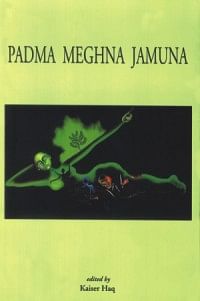Padma Meghna Jamuna

The title of this review is the evocative one of the book under review, a collection of modern poetry from Bangladesh edited by Kaiser Haq, professor of English at Dhaka University. It was published this year from New Delhi by the Foundation of SAARC Writers and Literature. One is invited to sail on a huge river of poetry by Bangladeshis, largely in translation, but with also a few in the original English.
Introductions to such anthologies, especially of poetry, are difficult to write. This is especially so in the case of Bangladesh, where one must define, elucidate, demarcate and sum up within the space of a few pages the specific product of a geographical area that nevertheless shares with "the Bengali-speaking parts of India…the entire Bengali literary heritage that had its inception in the Buddhist Charyapadya, and over the centuries grew to encompass a broad range of folk literary forms, from the devotional Vaishnava lyrics to gripping narratives like the Manasamangal, before the impact of British rule 'globalized' Bengali literature by infusing varied western influences." Kaiser Haq does a terrific job here, lucidly unpeeling the layers, and convincingly makes a case for taking as a starting point for modern Bangladeshi poetry (given that we "adopt(ed)...Kazi Nazrul Islam as the national poet of Bangladesh,") from 1942 onwards, the year Nazrul fell silent. An exception was made in the case of Sufia Kamal since, even though her poetry pre-dated this starting point, "from the 1950s onwards that she really began to make her presence felt."
The collection has 73 poets in translation, and three who write in English, spread over some 215 pages. It leads off with Sufia Kamal, and ends with Audity Phalguni in the translation section, arcing over the intervening decades and poets - Abdul Ghani Hazari, Hasan Hafizur Rahman, Al Mahmud, Shamsur Rahman (of course!), Syed Shamsul Haq Belal Chowdhury, Abdul Mannan Syed, Rafiq Azad, Ruby Rahman, Zarina Akhtar, Taslima Nasrine, Shamim Reza are some of the names. The three English language poets are Kaiser Haq, Firoz Ahmed-ud-din and Farida Majid. Given the disorganized, individual and idiosyncratic nature of translations from Bengali to English in Bangladesh, especially of poems, it is to be expected that the translations are of uneven quality. Overall, though, the jarring points are surprisingly low (perhaps because the editor oversaw "a fair amount of new, freshly commissioned" translations), and superior paper and print quality make for a pleasant reading experience. The biographical notes, always a weak point in such Bangladeshi collections, here are crisp and well-written. A few translator bios are missing, no doubt due to pressure of deadlines, which also account for a few typos and unwarranted capitalizations of words. The principal design flaw, as it were, is the loud 'branding' of the book as a SAARC/FOSWAL product, with an overly lengthy bio of its founder Ajeet Cour and her detailed note about the organization on the back cover.
But then, there's always a ticket price to pay for a memorable boat ride.

 For all latest news, follow The Daily Star's Google News channel.
For all latest news, follow The Daily Star's Google News channel. 



Comments